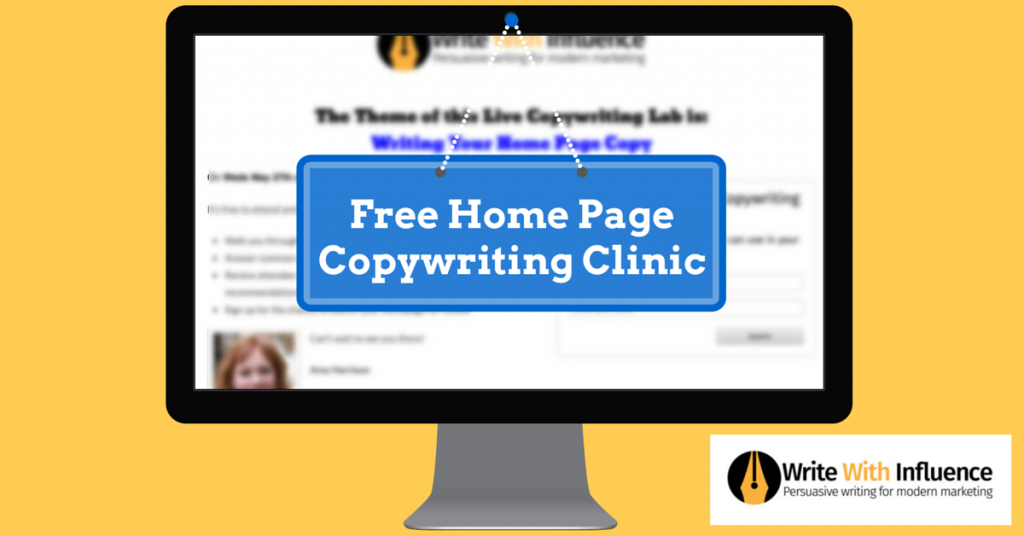May 27th, Free Home Page Copywriting Clinic click here to find out more
As you may know, I’m on a mission to help business owners write more persuasive marketing content (and actually enjoy the process).
During my research into the problems that hold people back, I came across this question time and time again:
“I’m never sure what to write on my homepage. I really struggle to sell myself succinctly and I’m not sure what information to include, there’s so much I want to say. No matter how many times I write it, I’m just never really happy with it.”
This is a killer for many reasons:
- It kills time – who else has spent hours thinking and rethinking about what to put on that all-important first page?
- It kills confidence – if you’re not happy with your homepage, you’re not going to be happy to send people to it
- It kills conversions – all the fuss, faff and confusion in a homepage message can turn away potentially perfect customers
I get it. The home page is one of the most important pages you’ll write. It can make or break whether or not people continue to look around your site, get in touch and even buy.
Which is a big part of the problem – you’re probably putting too much pressure on yourself, which in turn is killing your confidence and putting you in a state of pen-paralysis.
So let’s see if we can break this with the following 5 steps.
If you really want help writing your business homepage copy, don’t miss next week’s Live Copywriting Lab where we will be looking at writing home page copy (and you have a chance for me to review your content for free). Find out more here.
1: Remember, it’s not about you
People get stuck writing their homepage because they feel vulnerable and exposed. How do you even begin describing who you are and what you do?
Well, the important thing is that you don’t start there. You start with your customer. Don’t write by looking from behind-the-scenes out into the world, write by imagining you are the customer coming to your website for the first time.
And what you need to ask yourself is:
What are the most pressing issues that my customer wants to solve?
You might be tempted to include details about the history of your company on your homepage, or the business contracts that you’ve recently won, but that might not be adding value in your customer’s eyes.
Let’s say you sell website analytics software, rather than listing your products and explaining the algorithms you use to calculate reports, put yourself in your customer’s shoes. He might be thinking:
- How can I track what people are doing on my website?
- How can I improve conversions?
- How can I get people to stay longer on my site?
If you’re a career coach, your visitor might be thinking:
- How do I find a job that suits my talents and personality?
- How can I be well paid and do something I love?
- How do I find out what jobs I’d be well suited to do?
These are the questions that should drive the content that you include. This not only makes sure that you are focused on delivering value to your customer, but it takes the spotlight off you, makes it less personal and much easier to write.
2: But it is also about you…
All of your website copy is about building a bridge. A bridge between what your customer has, and what you have to offer. You have to be strategic about your home page and ask yourself:
What are the most pressing details I want my customer to know about me?
For example:
- Do you work in a particular industry / industries?
- Do you operate in a particular area?
- What’s your most popular service?
- What’s a key aard / testimonial you’ve received that shows off your stripes?
- Should they call or email you to make an appointment?
- What are the services you offer to help them?
Answering these top 2 questions really makes you focus on building that bridge between your prospects and your business. Is it relevant to place a big feature of your latest blog post if you really want to drive phone calls and enquiries?
This helps you plan what information you should be including on your site, and makes sure that you’re not hiding information that could lead to a sale.
3: DO limit the choices
One of the reasons people get hung up on their homepage copy is because they feel they need to include a lot of information. While long-form home pages can get good results, if the pressure to write a ton of content is stopping you from hitting publish then it’s no good, a perfect but unfinished page never makes any sales.
Now, if you have lots of product, or different types of services, here’s my advice:
Don’t put them all on your homepage
Yes, you want to tell people what you do, but a 20 long bulleted list is too much and easy to ignore. Instead:
- Focus on your most important services
- Group your services into categories.
For example, say that you offer:
Jazz, classical, modern and other styles of dance classes.
And then link to your services page. Or an example of grouping them together might be:
We have a number of classes in the dance, drama and musical theatre categories
4: Get it to 80% (and get it out there)
Perfection is a killer when it comes to writing anything. As they used to tell us a scriptwriting school:
A script is never fully finished, merely abandoned
It’s true. Every single piece of writing can be tinkered with, tweaked, changed and altered by a writer. It’s never ending. So YOU have to put the cap on your writing efforts if you want to stay sane. And the only way to do that is to stop waiting until you reach perfection. You will never get there.
And as you spend time wondering if this or that word is right, sales could be passing you by. Get your homepage to ‘good enough.’ Good enough so that you have a clear message about what you do, answer a problem of your customer’s and showcase your skills, and then get it out there.
Your content will change. That’s the beauty of the internet, you can change, update and modify as you go, but I can’t urge you enough to get started and get eyes on it. Because that’s when you’ll really know if it’s working or not.
You can’t write business homepage copy in a vacuum, you need the input of your visitors. What might seem perfect in your head, might not quite hit the mark with customers. Get it out there, get it seen and then course correct based on the feedback.
5: Be careful who you ask to read it…
It’s a common temptation to write your homepage copy and then send it to friends and family for feedback. This can be a BIG mistake. Why?
Your friends and family may not be your ideal customers.
Rather than give you feedback from a customer’s point of view, they might say what they think is being helpful:
- I don’t think it really shows off your personality
- I think you should include more about how long you’ve been in business
- I’m not sure I really like that word, isn’t it a bit strong?
They mean well, but if you really want to test the power of your homepage copy, here’s a quick tip:
Find someone who fits your ideal customer profile.
Ask them to read your homepage.
Ask them if they want to find out more?
That will tell you everything about whether or not your homepage is delivering value.
Want me to review your homepage copy?
Next week I’m holding a Live Copywriting Lab, and the topic is all about writing your home page. I’m going to be:
- Sharing practical techniques you can use straight away to plan and write your homepage copy
- Answering common homepage copy questions
- Reviewing actual business home pages live with my recommendations
For the chance to have your business featured, and to attend the live copywriting lab, click here.


Outstanding checklist … I loved numbers 1 and 2: “It’s NOT about you. It IS about you.” (my paraphrase.)
That whole note about being careful with who you ask to read it was very insightful.
I just listened to a podcast from ILoveMarketing where they talked about everybody having an opinion when it comes to marketing. But ask someone what they think of your approach to brain surgery and they defer.
Not that I do “brain surgery.” You on the other hand … 🙂
You’re so right Aaron (I love ILoveMarketing – great podcast!). It’s the same with writing. I can’t remember which copywriter said it but he said when a client took out a pen to review the copy he knew it was doomed. They were reading as an ‘editor’ and not as a customer.
The other danger in asking people you know what they think is that they feel pressure to point something out and often scrabble around for anything to say. Asking someone if they want to find out more is much more focused and gives you a clearer answer!
Oh, and I used to do brain surgery… they kind of won’t let me anymore. 😉
Oh … the dreaded “client pen.” Great red flag.
And I simply can’t believe they no longer let you crack folk’s skulls open.
Thanks Amy. Great advice.
Love the line from script school.
There really is a point where the last draft
has to be the last draft. No more tweaks.
The first step is to acknowledge there is no end… the second step is to accept it! (Harder to do) 🙂